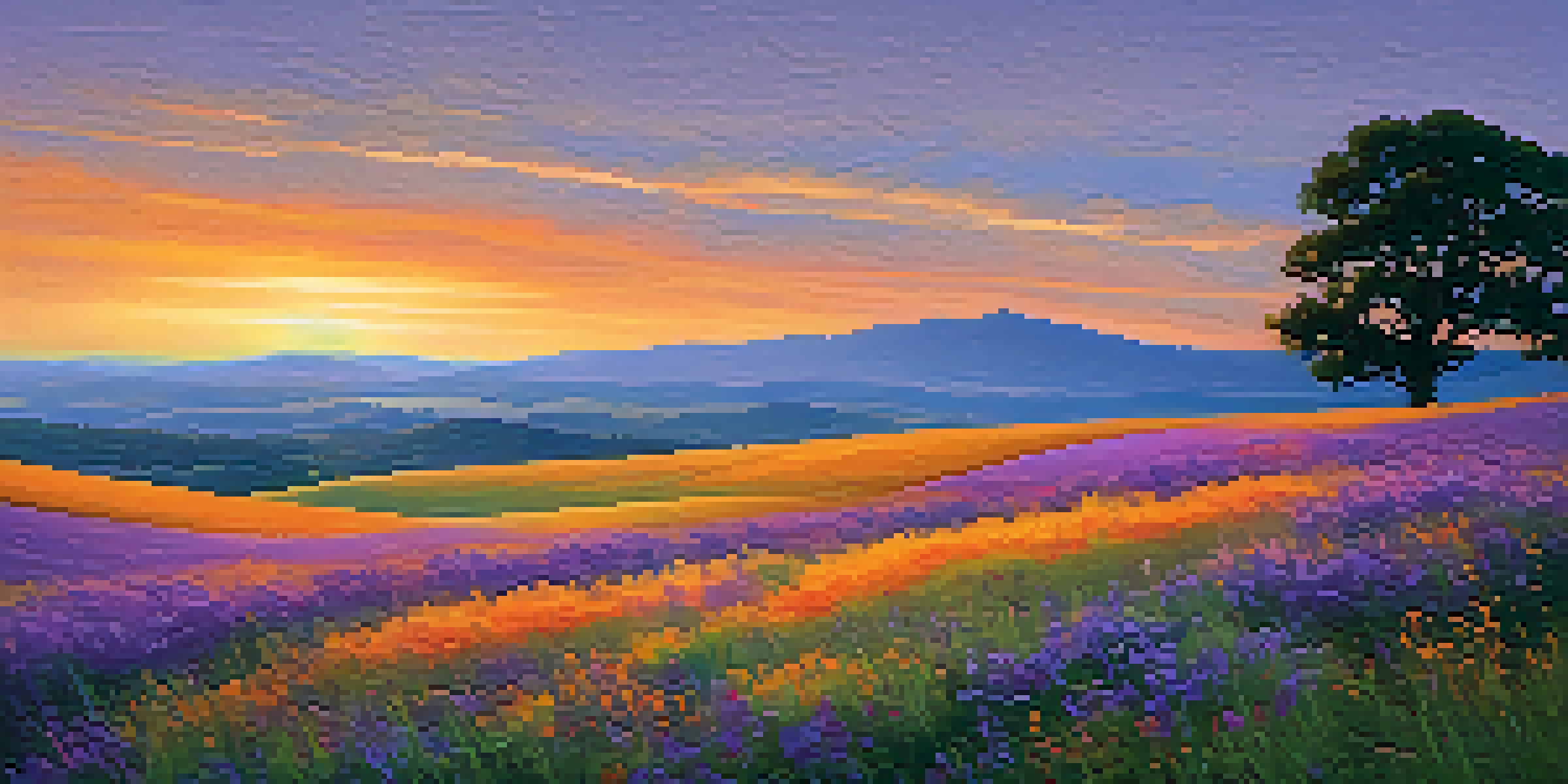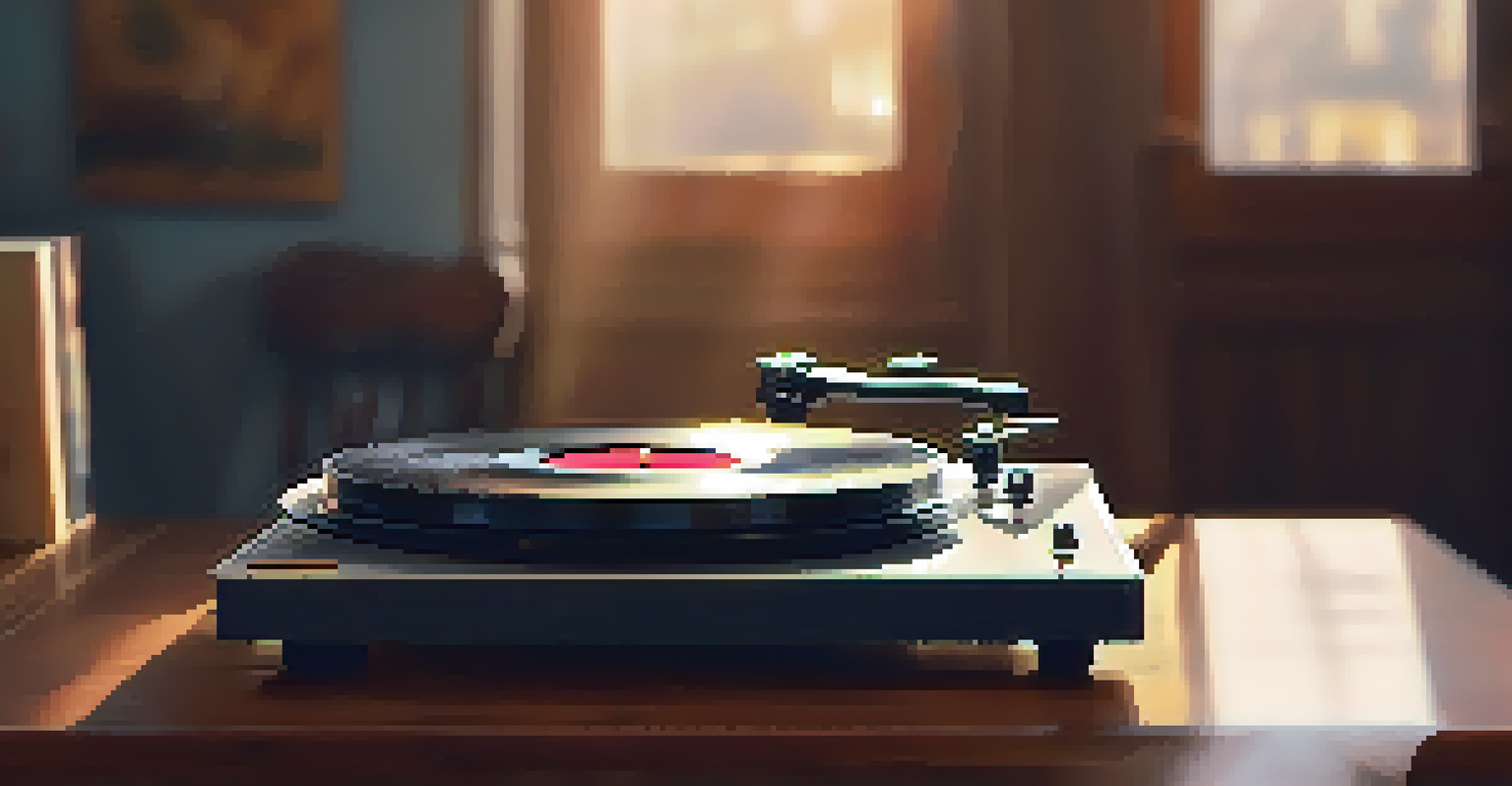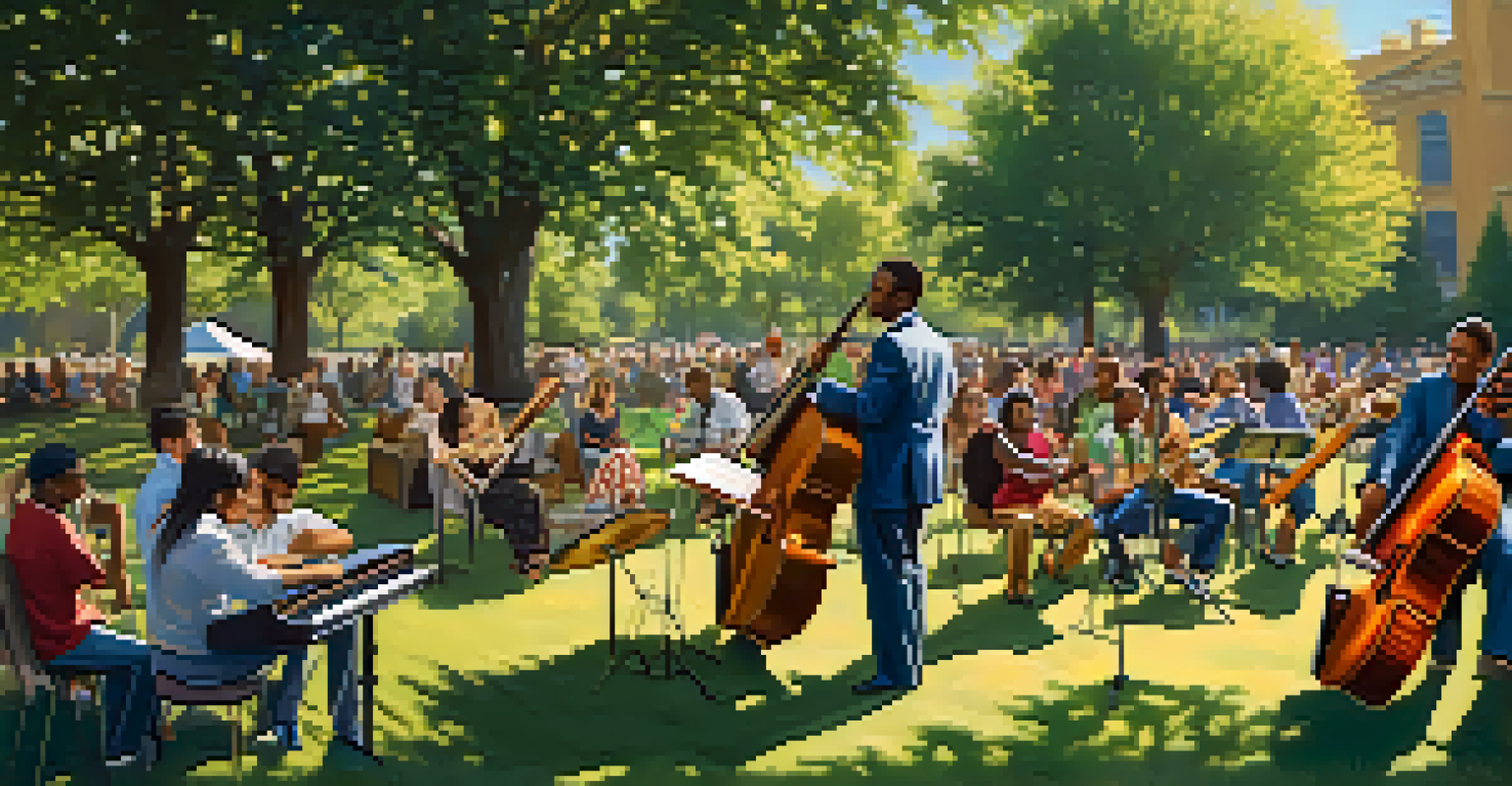Harnessing the Power of Music Scores in Film Storytelling

The Role of Music in Setting Film Atmosphere
Music plays a crucial role in establishing the atmosphere of a film. It can evoke a range of emotions, from joy to fear, often before a single word is spoken. Think of the haunting strings in a horror film that build tension, or the uplifting score in a romantic comedy that enhances the warm, fuzzy feelings.
Music can name the unnameable and communicate the unknowable.
The right music score can transport viewers into the film's world, making them feel as if they are part of the story. For instance, the sweeping orchestral pieces in epic adventures can make audiences feel the grandeur of a vast landscape. This immersive experience is what draws viewers deeper into the narrative.
Moreover, music can serve as a storytelling device itself, hinting at plot twists or character developments. Just as a character's actions can reveal their intentions, the music can foreshadow events, making viewers more engaged and attentive to the unfolding story.
Creating Emotional Connections Through Music
One of the most powerful aspects of music in film is its ability to forge emotional connections. A well-composed score can resonate with audiences, stirring memories or feelings that align with the film's narrative. For example, the iconic score of 'Titanic' not only enhances the film's romance but also evokes a sense of nostalgia.

This emotional depth is often achieved through recurring musical themes associated with specific characters or moments. When viewers hear a familiar melody linked to a beloved character, it can trigger an emotional response that deepens their investment in the story. It's like hearing an old song that reminds you of a significant event in your life.
Music Enhances Film Atmosphere
The right music score sets the emotional tone of a film, immersing viewers in the story before any dialogue is spoken.
Additionally, the use of silence in contrast to music can heighten emotional moments. A sudden drop in music during a pivotal scene can leave audiences holding their breath, making the subsequent notes even more impactful. This dynamic interplay between sound and silence is a powerful tool in film storytelling.
Music as a Narrative Device
Beyond evoking emotions, music can serve as a narrative device that helps convey a film's themes and messages. Composers often craft scores that reflect the underlying story arcs, adding layers of meaning. For example, in 'Inception', the music mirrors the film's complex structure and shifting realities.
Film music should have the ability to express the unexpressed.
This thematic scoring can provide context that enhances the audience's understanding of the plot. A character's growth might be reflected in the evolution of their musical theme, subtly guiding viewers through their journey. This technique enriches the storytelling experience by connecting viewers to the narrative on multiple levels.
Furthermore, soundtracks can also include songs with lyrics that directly relate to the film’s themes. Films like 'Guardians of the Galaxy' use popular music to not only entertain but also to deepen the storyline, making the music an integral part of the narrative fabric.
The Impact of Cultural Context in Film Scores
Cultural context plays a significant role in how music scores resonate with audiences. Different cultures have unique musical traditions that can shape the emotional landscape of a film. For instance, a score featuring traditional instruments can evoke a sense of place and authenticity, enhancing the story's setting.
Films set in specific cultural environments often incorporate local music elements to create a more immersive experience. This not only enriches the storytelling but also educates viewers about the culture being portrayed. A film like 'Crouching Tiger, Hidden Dragon' brilliantly blends Western orchestral music with Eastern traditional motifs.
Emotional Connections Through Music
Music forges deep emotional ties with audiences, often resonating with personal memories and enhancing engagement with the narrative.
Moreover, the cultural significance of certain musical styles can further amplify a film’s messages. For example, using jazz in a film about the African American experience can evoke a deep sense of history and identity, making the film's themes more impactful for the audience.
The Collaboration Between Directors and Composers
The relationship between directors and composers is essential in crafting a film’s score. Directors often have a vision for the emotional tone they want to convey, and composers translate that vision into music. This collaboration can lead to innovative scores that enhance the film's narrative.
For instance, directors like Quentin Tarantino are known for their distinctive musical choices, often collaborating closely with composers to curate unique soundtracks that become synonymous with their films. This synergy can create iconic moments that audiences remember long after the credits roll.
Additionally, this partnership can also lead to experimentation with sound, as composers push the boundaries of traditional scoring. By blending genres or incorporating unconventional sounds, they can create a soundtrack that not only supports but elevates the storytelling.
The Evolution of Film Scoring Techniques
Film scoring has evolved dramatically over the decades, reflecting changes in technology and audience preferences. Early film scores were often performed live, but today, composers have access to advanced software and recording techniques that allow for greater creativity. This evolution has led to richer, more complex scores that can blend acoustic and electronic elements seamlessly.
Moreover, the rise of digital music libraries has made it easier for filmmakers to experiment with different styles and sounds. Composers can now draw inspiration from a wide range of genres, creating hybrid scores that enhance the storytelling experience. For example, combining orchestral music with electronic beats can evoke modern themes while retaining classic elements.
Cultural Context Shapes Scores
Incorporating cultural elements into film scores enriches storytelling and connects audiences to the film's setting and themes.
This evolution also includes the integration of sound design into scoring, where ambient sounds and effects become part of the musical landscape. Films like 'A Quiet Place' showcase how sound can be used strategically to build tension and immerse viewers, blurring the lines between score and sound design.
The Future of Music in Film Storytelling
As technology continues to advance, the future of music in film storytelling looks promising. Virtual reality and interactive films are beginning to reshape how music is used, creating personalized sound experiences for viewers. Imagine a film where the score adapts to your emotional responses as you watch; this could revolutionize storytelling.
Additionally, artificial intelligence is starting to play a role in composing music. While some may view this as a threat to traditional composers, it can also serve as a tool for creativity, allowing composers to explore new sounds and ideas. This fusion of technology and artistry could lead to innovative scoring methods that enhance the cinematic experience.

Ultimately, the heart of film music will always remain the same: to connect with audiences on an emotional level. Whether through traditional orchestration or cutting-edge technology, the power of music in storytelling will continue to resonate, making films more impactful and memorable.